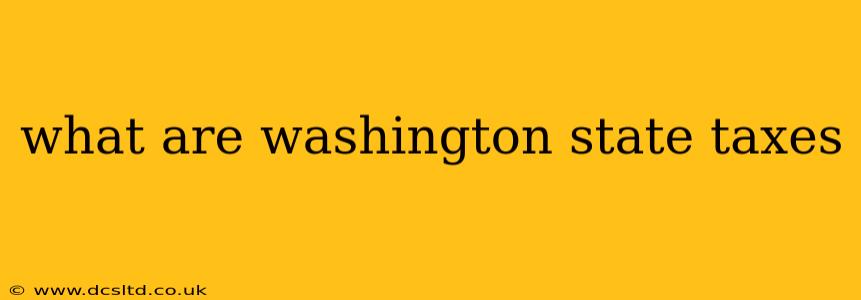Washington State boasts a unique tax system, significantly different from many other states. Understanding its nuances is crucial for both residents and businesses. This comprehensive guide will delve into the specifics of Washington State taxes, addressing common questions and providing clarity on this often-complex topic.
What Taxes Does Washington State Have?
Washington State doesn't have a personal income tax. This is a major differentiating factor compared to most other states. However, this absence is compensated for by other taxes, including:
-
Sales Tax: Washington has a statewide sales tax of 6.5%, but this can vary depending on the city or county. Many localities add their own local sales taxes, resulting in a higher overall rate in some areas. Certain items are exempt from sales tax, while others are subject to special rates.
-
Property Tax: Property taxes fund local schools, public services, and other government functions. The rate varies widely across counties and depends on the assessed value of your property. Regular reassessments ensure the tax reflects the current market value.
-
Business & Occupation (B&O) Tax: This tax applies to businesses operating within Washington State. It's based on the gross receipts or income of the business, categorized into various activities. The rate varies depending on the business activity.
-
Use Tax: This tax applies to goods purchased outside Washington but used within the state. It aims to prevent individuals from avoiding sales tax by purchasing out-of-state. It's essentially a way to equalize the tax burden.
-
Other Taxes: Washington also levies taxes on things like motor vehicle fuel, inheritance, and certain excise taxes. These vary in their application and rates.
What is the sales tax rate in Washington State?
The base Washington State sales tax rate is 6.5%. However, it's crucial to remember that local sales taxes are often added, leading to a higher effective rate in many cities and counties. To determine the exact sales tax rate applicable to your location, you should consult your local government's website or contact the Washington State Department of Revenue. Some cities and counties might have rates exceeding 10%.
How is property tax calculated in Washington State?
Property tax in Washington is determined by the assessed value of your property multiplied by the tax rate set by your local taxing district. The assessed value is typically a percentage of the property's market value, determined by the county assessor. Tax rates vary considerably depending on local government budgets and services provided. It’s crucial to check your county assessor's website for details specific to your property.
Does Washington State have an income tax?
No, Washington State does not have a personal income tax. This is a significant difference from many other states. The state relies more heavily on sales, property, and B&O taxes to generate revenue.
What is the B&O tax in Washington State?
The Business & Occupation (B&O) tax is a tax on the gross receipts or income of businesses operating in Washington State. The rate and calculation method vary significantly depending on the type of business activity. There are different classifications and rates for manufacturing, retail, service, and other business types. You'll need to consult the Washington State Department of Revenue for specific details relevant to your business structure and activity.
How do I file my Washington State taxes?
Since Washington doesn't have a personal income tax, the filing process primarily involves sales, property, and potentially use taxes. Property tax is typically paid directly to your county treasurer, while sales and use taxes may involve filings depending on business activity and whether you're required to collect sales taxes. For details on filing requirements and processes, visit the Washington State Department of Revenue website. They provide detailed instructions, forms, and online filing capabilities.
Disclaimer: This information is intended for general guidance only and should not be considered professional tax advice. For specific advice tailored to your situation, consult a qualified tax professional. Tax laws are subject to change, so always refer to the official Washington State Department of Revenue website for the most up-to-date information.
